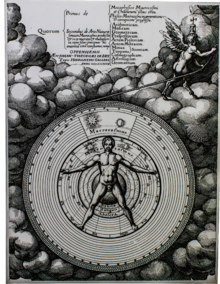Anthropocentrism

Excerpt from the copperplate engraving on the title page of Volume 1 of “Utriusque cosmi… Historia” (1617–19) by Robert Fludd
Anthropocentric ( Greek ἄνθρωπος ánthrōpos “man” and Latin centrum from old Greek κέντρον kéntron “center”) means that man understands himself as the center of worldly reality. Anthropocentrism has an ideological , an ethical and a religious component as an intersection.
ethics
Anthropocentrism is an ambiguous term. On the one hand, it denotes an epistemic fact, namely that every ethical model was made by people and to this extent represents a human system that can only be understood on the basis of people. At this level (epistemic level), no decision is made as to whether and to what extent humans are more important or less important than other living beings. The second level is a moral one. Moral anthropocentrism posits people as the most important element of ethics in ethical discussion. Environmental protection, animal welfare and are to be understood as norms that make sense for people.
Characteristics of moral anthropocentrism are:
- Basic-Needs-Argument: As humans, humans are dependent on nature. Protecting nature is necessary in order to secure human livelihoods.
- aesthetic argument: nature is unique and indispensable for humans. Apart from material concerns, humans need nature in order to be able to live well and happily.
- Pedagogical argument: Treating nature with respect and dealing with it well educates people to be more peaceful and better with other people.
Physiocentrism is contrasted with anthropocentrism as an ethical model . Moral value is attached not only to the human being, but also in various forms to the wider nature. Here, too, it is true that an epistemic and a moral physiocentrism can be distinguished. An epistemic physiocentrist is someone who says that objective values are fixed in nature and that norms of action exist even without humans, which, if there are humans, have to obey them. On the moral level, physiocentrism means that the primary goal of ethical reflection should not be people, but objects from the realm of nature (to which the person belongs). So it is possible to be an epistemic anthropocentrist and a moral physiocentrist or vice versa.
Characteristics of moral physiocentrism are:
- Pathocentrism : the ability to suffer is the criterion for demarcation. Morally “relevant” objects are therefore humans and more highly developed animals, in which the ability to suffer is obvious, such as B. in monkeys, horses and dogs.
- Biocentrism : Every living being has a moral intrinsic value. Was u. a. Designed by vegan or vegetarian people, animal rights activists and environmental activists; but is also propagated by theologians like Rupert Lay and the Nobel Peace Prize laureate Albert Schweitzer , who advocates more biophilia against slipping into an inhuman world. See also the religion of Jainism , in which non-violence towards all living beings is a basic ethical principle.
- Holism : Morally relevant criterion is being in itself. Therefore, not only living beings, but also inanimate nature are relevant for ethical action.
religion
In connection with religion, anthropocentrism denotes the point of view that not God or deities are at the spiritual center of the world (as in theocentrism ), but man. The term anthropocentrism here means that earthly, human activity is the focus of religion. The transition from theocentrism to anthropocentrism took place for the first time in antiquity and is described by the Greek philosopher Thales of Miletus in 600 BC. Initiated.
The Christianity is Christ-centered and thus theocentric and anthropocentric same time, because it has Jesus Christ as the center, which is both God and man. Anthropocentrism and theocentrism are therefore not opposites in Christianity, but are inextricably linked. While the theocentric side was emphasized in the Middle Ages, modern theology is more determined by the anthropocentric view of the Christian faith.
Trivia
A saying used in connection with anthropocentrism is "Man is the measure of all things", which goes back to the ancient Greek philosopher Protagoras .
See also
- Androcentrism
- Anthropic principle
- anthropomorphism
- Offenses of mankind
- Philosophical anthropology , theological anthropology
- Speciesism
literature
- Otfried Höffe : Lexicon of Ethics , 7th edition. Munich, Beck 2008, ISBN 978-3-406-56810-7 : Anthropocentric - biocentric (2 pages)
Web links
- www.umweltethik.at Collection of articles on environmental ethics
swell
- ↑ Dives in misericordia. About divine mercy . “While different spiritual currents in the past and the present tended and tend to separate theocentrism and anthropocentrism from one another and even to bring them into opposition to one another, the Church endeavors, following Christ in them, to bring their organic, deep connection into human history. “Quotation from the apostolic blessing of Pope John Paul II on divine mercy (November 30, 1980).